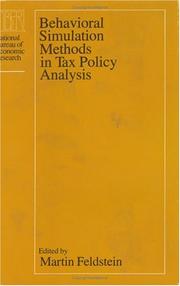| Listing 1 - 1 of 1 |
Sort by
|

ISBN: 0226240843 9786611223335 1281223336 0226241750 9780226241753 9780226240848 Year: 1983 Publisher: Chicago: University of Chicago press,
Abstract | Keywords | Export | Availability | Bookmark
 Loading...
Loading...Choose an application
- Reference Manager
- EndNote
- RefWorks (Direct export to RefWorks)
These thirteen papers and accompanying commentaries are the first fruits of an ongoing research project that has concentrated on developing simulation models that incorporate the behavioral responses of individuals and businesses to alternative tax rules and rates and on expanding computational general equilibrium models that analyze the long-run effects of changes on the economy as a whole. The principal focus of the project has been on the microsimulation of individual behavior. Thus, this volume includes studies of individual responses to an over reduction in tax rates and to changes in the highest tax rates; a study of alternative tax treatments of the family; and studies of such specific aspects of household behavior as tax treatment of home ownership, charitable contributions, and individual saving behavior. Microsimulation techniques are also used to estimate the effects of alternative policies on the long-run financial status of the social security program and to examine the effects of alternative tax rules on corporate investment and of foreign-source income on overseas investment. The papers devoted to the development of general equilibrium simulation models to include an examination of the implications of international trade and capital flows, a study of the effects of capital taxation that uses a closed economy equilibrium model, and an examination of the effect of switching to an inflation-indexed tax system. In the volume's final paper, a life-cycle model in which individuals maximize lifetime utility subject to a lifetime budget constraint is used to simulate the effects of tax rules on personal savings.
Taxes --- United States --- Taxation --- Fiscal policy --- Simulation methods. --- -Taxation --- -politique fiscale --- eua --- AA / International- internationaal --- US / United States of America - USA - Verenigde Staten - Etats Unis --- 336.61 --- 336.201 --- Duties --- Fee system (Taxation) --- Tax policy --- Tax reform --- Taxation, Incidence of --- Finance, Public --- Revenue --- Economic policy --- Simulation methods --- Simulation methods, --- fiscaal beleid --- vsa --- Financieel beleid. --- Fiscaal regime: structuur en evolutie. Fiscale hervorming. --- Government policy --- politique fiscale --- Fiscaal regime: structuur en evolutie. Fiscale hervorming --- Financieel beleid --- Taxation - United States - Simulation methods. --- Fiscal policy - United States - Simulation methods. --- economics, tax policy, taxes, money, finances, government, governing policies, research project, simulation models, behavioral responses, individuals, businesses, computational general equilibrium model, long term effects, change, microsimulation, home ownership, saving behaviors, charitable contributions, taxation, united states of america, usa, american economy, fiscal, life cycle, methodology, labor, income, social security, welfare, domestic. --- United States of America
| Listing 1 - 1 of 1 |
Sort by
|

 Search
Search Feedback
Feedback About UniCat
About UniCat  Help
Help News
News